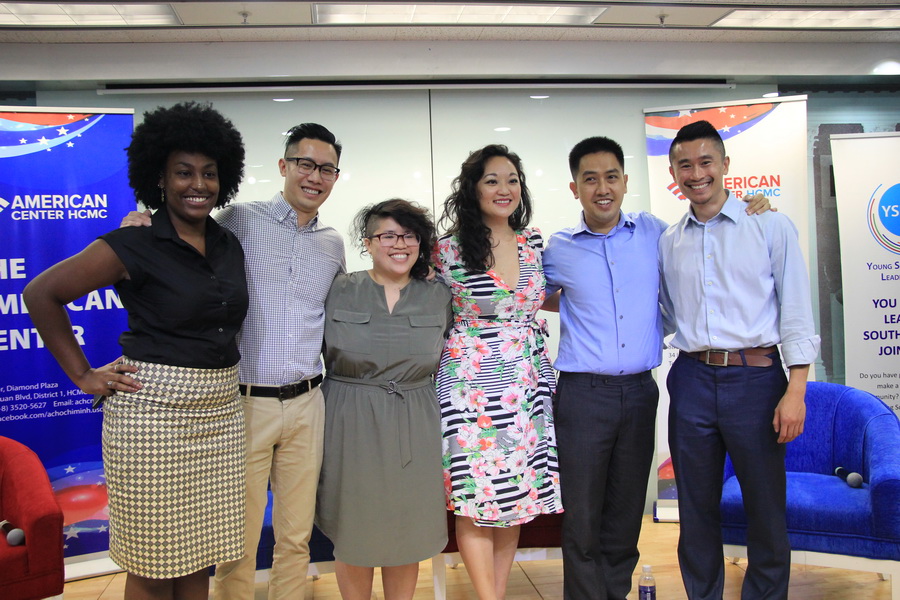“Our relation to Vietnamese culture and our roots will always be part of us,” said Anh Thu Nguyen, a ‘Viet Kieu’ (overseas Vietnamese) who returned to Vietnam six years years ago.
For many Viet Kieu raised in the U.S., coming back to the land of their parent’s birth is not about distance, but about the challenges they must overcome to see Vietnam as home.
At a discussion titled “Viet Kieu and Vietnamese: same, same or different?” held by the U.S Consulate General on Wednesday, Anh Thu and other overseas Vietnamese shared their own stories of coming back to live in their mother land.

Anh Thu Nguyen speaks to the listeners at teh discussion. Photo: Dong Nguyen/ Tuoi Tre News
Children coming back home
Most of speakers had one challenge in common: the language barrier they met despite learning basic Vietnamese from their parents.
In 2006, Mimi Vu left New York to work for East Meet West, an NGO in Vietnam’s central city of Da Nang.
She initially intended to stay in the coastal city for two years, but has wound up living in Vietnam for the past 11 years.
She is currently based in Ho Chi Minh City and works as the Director of Advocacy & Strategic Partnerships at Pacific Links Foundation, an organization which has combated human trafficking since 2013.
Her first years in Da Nang were full of obstacles, especially with the Vietnamese language. Before coming to Vietnam, Vu only spoke a little Vietnamese using a northern accent and had difficulty understanding her co-workers’ central Vietnamese vocabulary and intonations.
In the same boat is Don Le, co-founder of the Everest Education in Ho Chi Minh City, who, despite learning Vietnamese at early age, still had difficulty using the language.
“I had never thought of how to address myself because the only Vietnamese I talked to were my parents, so I only referred to myself as ‘con’ (a pronoun used by Vietnamese children when they address themselves to their parents),” he told listeners at the American Center.

Don Le. Photo: Dong Nguyen/ Tuoi Tre News
When it came to talk with Vietnamese people, it turned into a whole different and difficult story, because Vietnamese people address themselves based on the conversation’s context and whom they are talking to, he added.
“I didn’t know when I should address myself as con, anh, em,” he recalled.
Meanwhile, Anh Thu Nguyen, who works at the Baker & McKenzie Vietnam law firm, shared with a laughter that the language she spoke before coming to Vietnam was old-fashioned Vietnamese and she had to learn modern Vietnamese to adapt.
Vietnam is home
They chose different paths in returning Vietnam.
After Graduating from Standford in 2003, Don Le had a good job but still chose to surprise his parents by telling them he wanted to return to Vietnam in 2007.
Three years later, he joined his partners to found Everest Education, an international tutoring social enterprise whose mission is to transform how students learn in Vietnam.
The 36-year-old said he wanted to use his U.S. education to help students in Vietnam, a country he said is in the prime of its development and is ripe with opportunity.

Vietnamese -Americans share their stories of coming back to Vietnam with listeners at American Center. Photo: Dong Nguyen/ Tuoi Tre News
As time flies, these returning Vietnamese ties’ to Vietnam have got bolder and bolder.
Though Vietnamese and Viet Kieu relate to Vietnam in different ways, they still have a deep relationship with the country, according to Anh Thu Nguyen.
Meanwhile, for Don Phan, co-founder and CEO of Embe, a global baby products company operating in both the United States and Vietnam, the connection gets stronger each time he travels between the U.S. and Vietnam.
“Vietnam is now home,” he said, adding that he plans to raise his children with Vietnamese language and culture.

Don Phan. Photo: Dong Nguyen/ Tuoi Tre News
Mimi Vu still remembered when she told her parents that she would return to Vietnam.
“It’s your duty,” her father said.
Mimi graduated with a BAs in English Literature and French from the University of Michigan in 2000 before receiving an MPA in International Policy from New York University two years later.
Such background provides her enough chances to find a job in the U.S., but her parents continued to encourage her to return to Vietnam.
“My parents are proud Vietnamese, they always wanted me to come back and contribute to my homeland,” she said.

Mimi Vu (L) talsk to a listener as the discussion finishs. Photo: Dong Nguyen/ Tuoi Tre
According to Mimi, Vietnamese, no matter if they are Vietnamese in Vietnam or Viet Kieu, always seek out opportunity, try their best, and do whatever it takes to achieve their goals.
“That’s why Vietnam’s GDP is growing 6 percent,” she said. “We have a population thirsty for change and entrepreneurship.”
The series of talks will continue with two sessions respectively themed “Then and Now: Navigating the Generation Gap in Vietnamese Culture” on May 17 and “Sài Gòn Đẹp Lắm (Beautiful Saigon): Moving Back and Looking Ahead” on May 24.
Like us on Facebook or follow us on Twitter to get the latest news about Vietnam!





















































